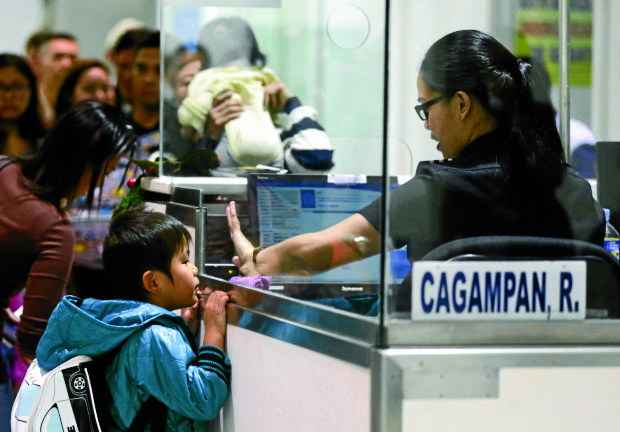Mass resignations, leaves plague immigration bureau

AIRPORT DUTY A woman immigration officer welcomes arriving passengers at Ninoy Aquino International Airport. —LYN RILLON
Long lines of travelers are back at Ninoy Aquino International Airport and Justice Secretary Vitaliano Aguirre II is blaming it on President Duterte’s order stopping the overtime pay of Bureau of Immigration officers at the airports.
Mr. Duterte’s order has led to resignations in the bureau and the situation is expected to get worse with more employees filing notices of departure, Aguirre said.
In an interview with reporters on Monday, the secretary disclosed that 32 immigration officers had left since January after Mr. Duterte barred the bureau from using the funds collected from airport express lanes for overtime pay.
Terminal leave
He said 50 more immigration officers had informed the bureau that they would go on leave for six months in preparation for their resignation and to look for new jobs.
Records at the bureau showed that more than 3,000 immigration officers have been on leave as of Feb. 17.
Article continues after this advertisementAs a result, immigration desks at airports are running short-handed, which explains the long lines of domestic and foreign travelers, Aguirre said.
Article continues after this advertisement“We are really losing our [immigration] personnel. Maybe the President could consider [recalling] his order,” Aguirre said.
“Many of them have stopped going to work or have gone on leave because their overtime will not be paid anyway,” he said. “The economy will be affected by this. Hopefully we could find a temporary remedy to this situation.”
Security risk
Aguirre said Transportation Secretary Arthur Tugade had expressed concern about the staff shortage, which, he warned, might also cause a security risk.
He said he had spoken with Cabinet Secretary Leoncio Evasco Jr. to find a “palliative measure” to deal with the problem.
“Our national security will be in danger because nobody is guarding the exit and entry [points] in our ports,” he said.
Aguirre said he understood the problems of the immigration officers, most of whom were receiving a maximum salary of P14,000 a month.
Before Mr. Duterte issued the order last December, he said immigration lane staff were getting as much as P48,000 a month in overtime pay.
He said the Department of Budget and Management had allocated P200 million to pay for the extra work rendered by the immigration officers, but the fund would allow a maximum of only P5,000 in overtime pay for each immigration officer.
P3-B yearly collection
According to Aguirre, the immigration bureau has been collecting some P3 billion yearly from the express lanes at the country’s international airports.
Red Mariñas, chief of the immigration bureau’s port operations division, said money problems were behind the resignations and leaves of absence at the bureau.
He said 62 percent of the immigration officers who manned counters at airport terminals came from the provinces.
Most of them spend P5,000 a month on average for lodging and they have to send money to their families in the provinces, he said.
“We’ve been using the fund for the past 20 years. It’s only now that we have experienced this problem. The distribution was disallowed and the fund had to be surrendered to the Department of Budget and Management,” Mariñas said.
The budget office said overtime pay for immigration officers should follow Civil Service Commission guidelines, which do not allow overtime pay in excess of 50 percent of employees’ basic salaries.
The express lane fund, generated from fees paid by foreigners for faster processing of permits, was established during the term of Miriam Defensor Santiago as immigration commissioner.
Mariñas said the fund was also used to pay job orders and contractual employees.
He said more bureau employees were seeking certificates of employment from the personnel department as they prepared to look for new jobs.
“We’ve been able to hire young professionals because of the decent pay. Now that it was disallowed, call center agents earn more than immigration officers, considering we are talking of national security, as they are the gatekeepers of the entry and exit points,” he said.
Working out a solution
Mariñas said the immigration bureau and the justice department were working with Malacañang to solve the problem.
“Our request is to suspend the implementation until such time that the immigration bill is approved,” he said.
The proposed immigration act would be the permanent solution to the problem, as it would upgrade the salaries of the bureau’s employees, he said.